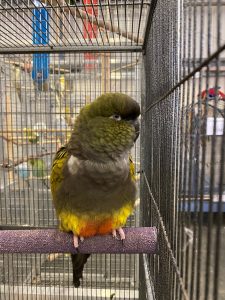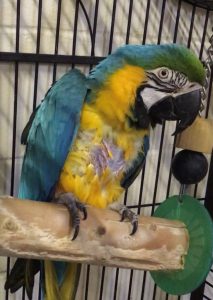Feathers Together take in birds in need. This often means that they have physical and/or psychological issues which cannot easily be reversed or resolved.
Many of these birds are not suitable for rehoming and are given long-term care either at Feathers Together or with a foster carer.
All our long-term residents are available to sponsor on an annual basis. Please see ‘Sponsor a bird’ for more details.
 Roger
Roger
Roger is a Patagonian Conure (Cyanoliseus patagonus). He arrived with us in November 2019 in very sorry state. He was relinquished to us by a local veterinary practice when his new order brought him in for a consultation because she had realised just how poorly he was when she had taken him in. Roger was in such poor condition that he didn’t even look like a Patagonian conure – his feathers were almost black and his beak and nails were so badly overgrown that he couldn’t preen or perch.
Our vet confirmed our suspicions of malnutrition and probably liver damage and concluded that Roger will not be able to be rehomed as he will required continued veterinary attention.
Fast forward a year and Roger was unrecognisable. After multiple beak and nail trims, a new diet of pellets (Psittacus Maintenance), low fat seed mixture (Deli Nature 61 Parrot) and lots of fresh fruit and vegetables, Roger is now able to preen, perch and behave like a real parrot. His plumage is incredible now, with so many colours and he looks twice the size thanks to his fluffy undercoat. He’s turned out to be a real sweetie and even readily accepts a harness so that we can provide him with outdoor exercise and natural light.
Willow
Willow is a cockatiel (Nymphicus hollandicus). Her previous owners took very good care of her but their little girl was allergic to feather dander so they had to relinquish her after just 6 months. When she arrived she had knocked her wing in her travel cage and there was a little blood. On closer inspection, Willow was suffering from a large feather cyst. Asking about her history, it seems she had always had this bump and from the day they brought her home they had bathed it regularly and kept it clean. It transpired that Willow was undergoing her first moult and two large primary wing feathers were trying to grow through the centre of the cyst and had become infected.
Willow was taken for veterinary treatment and given a course of oral anti-biotics, a pain relief injection and a topical treatment to keep the area clear of infection. After several weeks the infection cleared and the bleeding stopped. Willow’s wing, however, still had a large cyst and was preventing her from closing her wings in their normal position. More veterinary treatment was sought and the cyst removed.
However, the cyst formed again almost immediately and as Willow went through her next moult her cyst grew and bled as the wing feathers emerged. She is now awaiting surgery to remove her wing-tip and prevent the recurring problem. Covid-19 has meant that her surgery has had to be delayed as it is non-urgent and vets are struggling to see their normal caseload with all the additional restrictions.
Willow is currently pain free and enjoying life as the companion to an elderly male cockatiel. She is not being considered for rehoming until her surgery is complete and we can assess her long term future.
 Jess
Jess
Jess is a Blue-and-gold macaw (ara ararauna). She is around 6 years old and came to us with plucking issues. Her leg ring was too tight and was beginning to cause some swelling in her foot. After a thorough health check with our vet, it was recommended that her leg ring was removed under anaesthetic, and a series of blood tests and x-rays were performed. The tests showed that her calcium levels were extremely low. Thankfully all her viral tests came back negative and the x-rays confirmed no additional issues.
Jess is now on a new diet with pellets (Psittacus High Energy Maintenance), a low-fat seed mixture (Deli Nature 61 Parrot) and fresh fruit and vegetables daily. She’s taken a little while to warm up to her fruit and vegetables but she is trying new foods now. In additional, she receives a daily calcium supplement in her drinking water and a multi vitamin twice a week.
Although her feathers have not grown back completely, Jess is no longer actively plucking on a daily basis. Due to her complex needs and requirements for space, Jess is not suitable for rehoming in a domestic environment. We are awaiting a place at a local zoo, which is building a huge 70 foot long flight aviary for macaws, and Jess will be able to join their other macaws once the new facility is complete.
Dexter
Dexter is a Yellow-crowned amazon (Amazona ochrocephala ochrocephala). Dexter is in long-term foster care due to his ABV+ status. ABV (avian bornavirus) is a disease of birds, including parrots, which affects the nervous system. Symptoms can include poor appetite and digestion, problems with balance and co-ordination and affect other abilities such as eyesight and spacial awareness. Because ABV can be transmitted between birds, a special home had to be sought for Dexter where he will not come into contact with other birds. ABV is not particularly contagious (where compared with PBFD, for example), as it is only transmitted from one bird to another via faecal matter or bodily fluids – the usual route of infection is between birds that are housed together and paired up, or between adults and their chicks.
At present, Dexter is quite well, and is enjoying a diet of pellets, low fat seed mixture and lots of fresh fruit and vegetables, which he loves! He is on two medications which manage the symptoms of ABV as there is no cure. Feathers Together continue to pay for all of Dexter’s medication treatment, including his veterinary consultations, ongoing medication are care.
